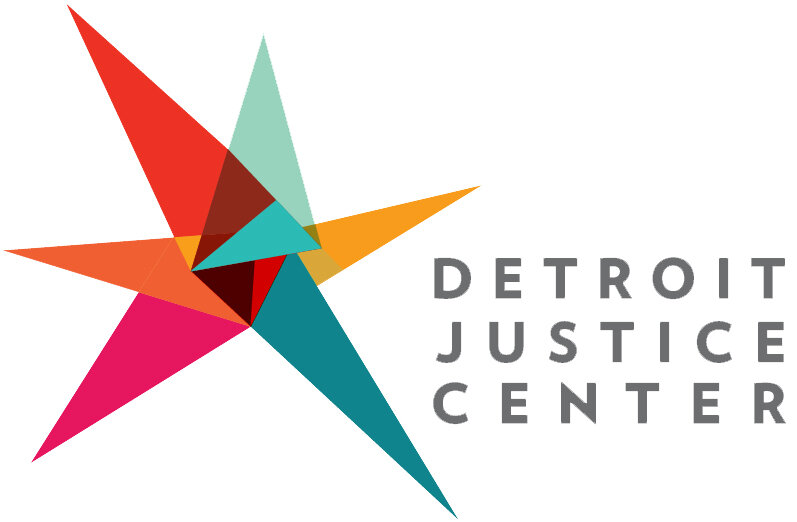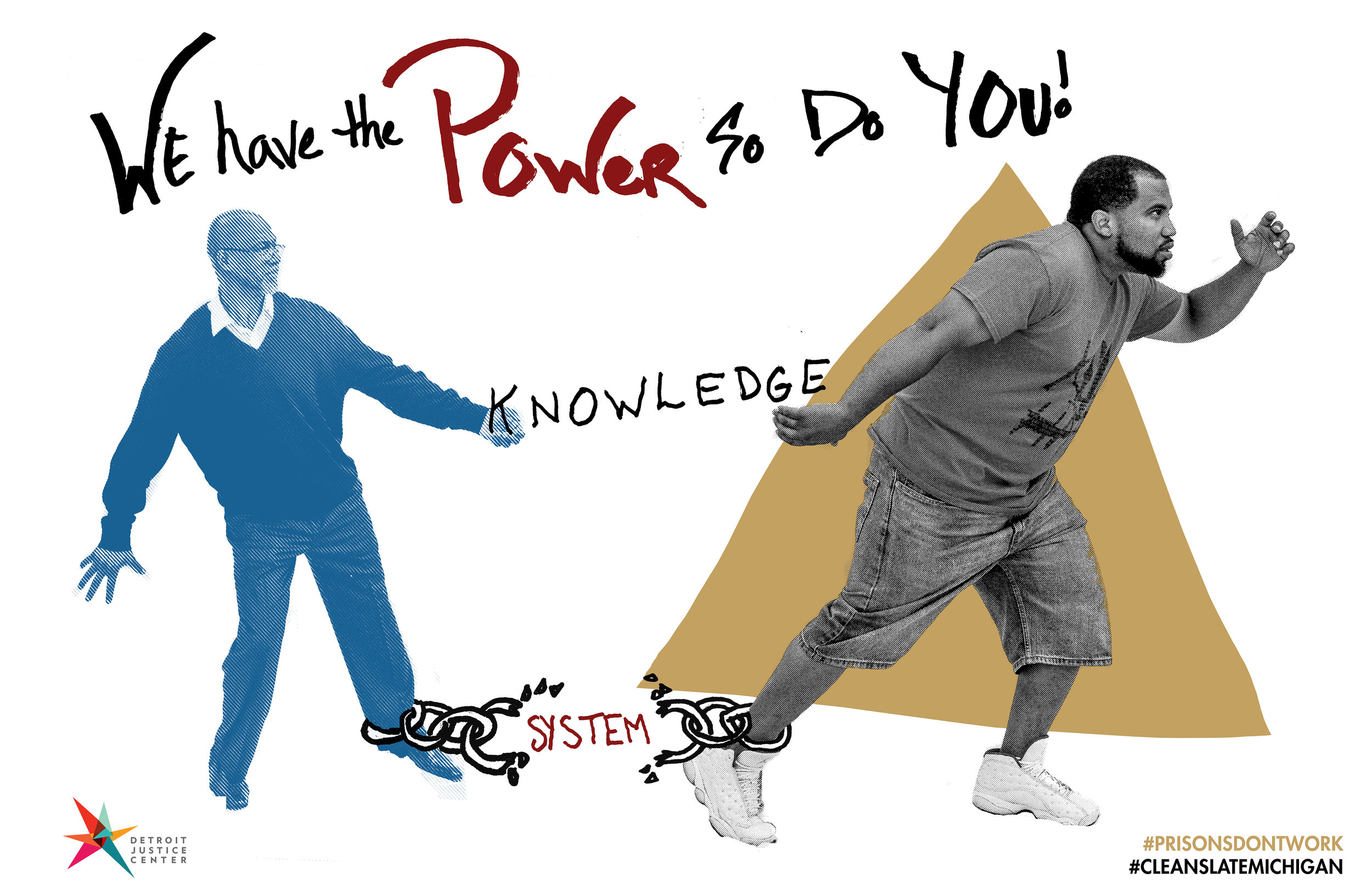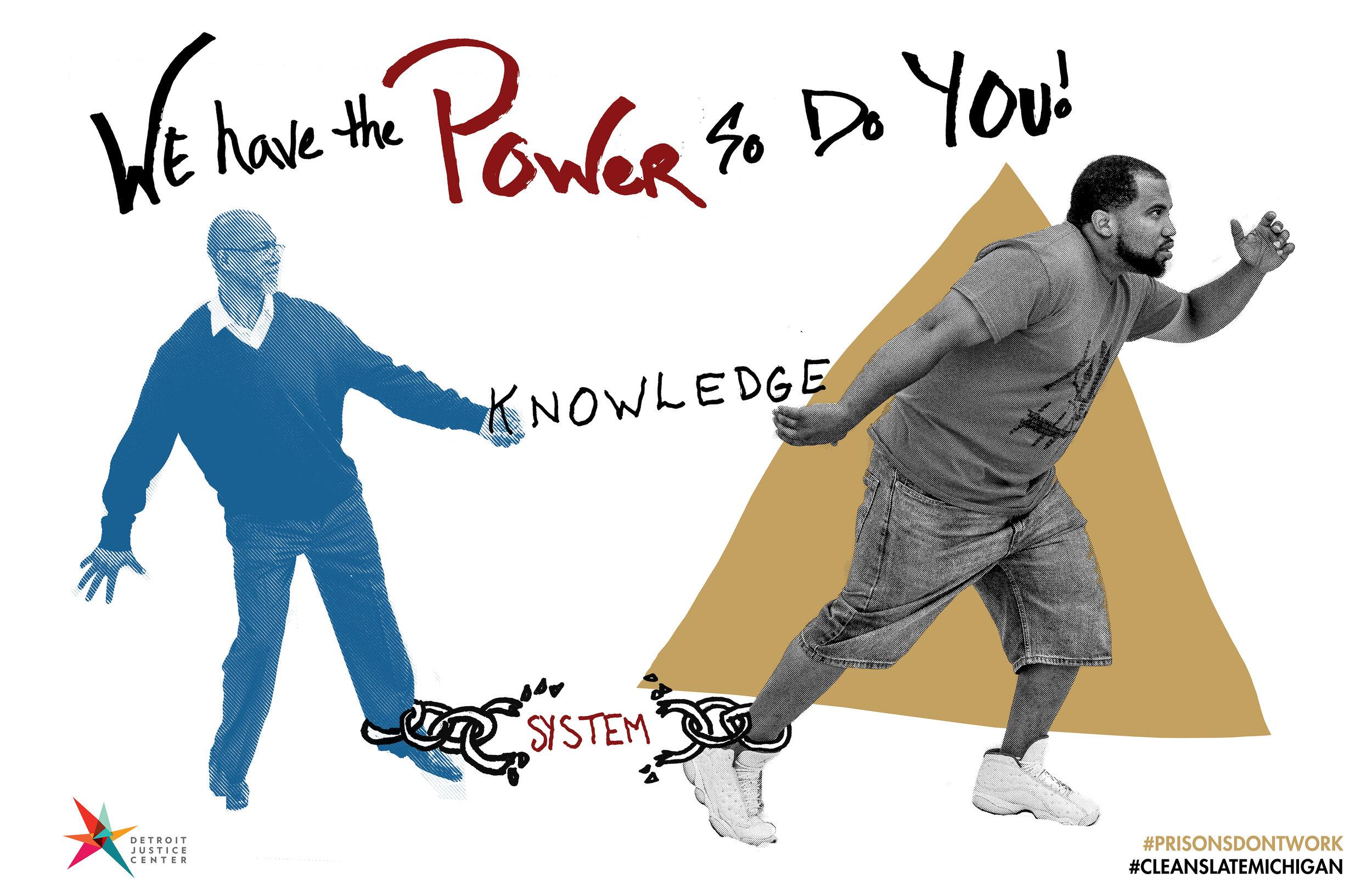One of the #CleanSlateMichigan posters created during our workshops with the People’s Paper Co-op
Contact: Megan French-Marcelin (megan@jlusa.org or 617-869-1194)
STATEMENT ON HOUSE BILL PACKAGE 4980-85 TO EXPAND SET ASIDE ELIGIBILITY AND TO AUTOMATE PARTICULAR EXPUNGEMENTS
Lansing, Mich. – Today, October 29, 2019, bill package HB 4980-85 regarding the expansion and automation of expungement (also referred to as “set-asides”) for certain convictions was voted out of the House Judiciary.
Detroit Justice Center, JustLeadershipUSA, NationOutside, and Michigan Faith in Action have jointly issued the following statement in advance of Tuesday’s hearing:
Our organizations applaud the efforts of the Michigan State Legislature to acknowledge that convictions for which Michiganders have already paid their debt to society should not extend into their lives as returning citizens and moreover should never constitute a life sentence. This unprecedented expansion should, therefore, be applauded. Yet, at the same time, we remain troubled by the arbitrary limits and deep carve-outs that are in direct conflict with the bill package’s stated intent to ensure fair chances.
Let us be clear, the breadth of this bill package is a testament to the lived experiences, collective knowledge, and hard work of the nearly 500 formerly incarcerated people who participated in listening sessions, town halls, legislative action days, and provided constructive feedback on each and every draft of these bills. The testimony of formerly incarcerated leadership to the House Judiciary on the daily exclusions faced as a result of a conviction was unprecedented. The power of the people was central to ensuring that the bill package went further than legislators anticipated or even expected was possible, removing some of the most insidious originally proposed provisions, including the contingency of paid restitution and the potential for a prosecutorial override.
The communities that have been most impacted by mass criminalization and its collateral consequences must be central to dismantling the lifelong consequences of the over-policing and over-criminalization of Black and brown communities and communities with low income.
With that said, these bills continue to diverge from common sense and scientific research in critical ways. HB 4980, commonly referred to as “Clean Slate,” places arbitrary limits on the number of convictions that may be set aside automatically. There is no research to support limiting the number of automatically expungible convictions at 2 felonies and 4 misdemeanors, and moreover it does not even follow the national standard of automatically expunging all non-serious misdemeanors. There is no reason that all misdemeanor convictions should not be automatically set aside after a period of what is currently ten years. In fact, supporting data clearly demonstrates that the majority of people desist from crime after only five years. To create limitations with such a long timeframe is to continue to wrongly stigmatize and harmfully burden Michigan’s most marginalized residents, and furthermore to leave families without access to shelter and food.
Clean Slate also raises questions about implementation. While the current system allows the automated expungement of four misdemeanors, the expansion package allows for all non-serious misdemeanors to be expunged. In the case of an individual with more than four misdemeanors, we ask: What governing body is deciding what comes under automation? Is that the decision of the individual, the court, or a mere fact of time elapsed? The answers to these questions must be determined prior to implementation.
On the expansion package, our organizations applaud the inclusion of most traffic offenses, but once again question the limitations placed on Clean Slate that will limit this expansion’s effectiveness. As recent testimony highlighted, many Michiganders with low income accrue traffic offenses simply because they do not have the money to pay the fines and fees attached to such offenses. If people cannot pay the fees attached to traffic offenses, it is ludicrous to expect them to pay for an expungement application. Only 6 percent of Michiganders who are currently eligible for expungement take advantage of it for this very reason. Traffic offenses, as found in the Department of Justice’s investigation in Ferguson, Missouri, criminalize poverty. No person should be subject to discrimination in housing and employment simply because they are poor.
The expansion package also broadens the number of felony convictions to three and implements a “one bad night” law (HB 4985) that allows for contemporaneous offenses to be treated as a single offense. By excluding crimes that include a weapon, assaultive crimes, and crimes for which the maximum sentence is 10 years or more, the provision limits its effectiveness in an era where prosecutorial upcharging remains prevalent and the definition of law remains inadequate. If offenses such as evasion or fleeing exclude individuals from access to set-asides, and if offenses with potentially long sentences exclude people from access to set-asides, we will once again see a disproportionate impact on Black and brown communities that have already been devastated by prosecutorial upcharging and longer, more severe sentences.
Finally, the bill package creates an onerous expungement process for marijuana convictions. This is preposterous in a state in which marijuana has been legalized. Automatic expungement for all possession charges and many distribution charges should be seen as part and parcel to reparations for a War on Drugs that was as racist as it was wrongheaded.
We stand in solidarity with community members and add our support to their demands, including automating set-asides for ALL misdemeanor convictions after five years (including traffic offenses) and expunging felonies through a matrix based on seriousness. We urge the House and Senate to expand Clean Slate to reflect community demands. We believe everyone deserves a WORKINGfuture and we stand ready to work with Michigan legislators and fellow advocates to add substantive changes to the legislative package.


